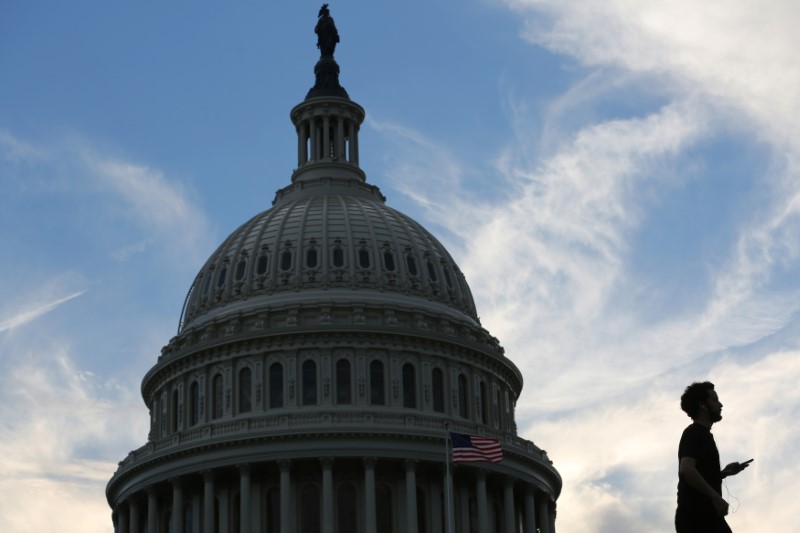By David Morgan and Trevor Hunnicutt
WASHINGTON/NEW YORK (Reuters) - The U.S. Congress may be headed for a reckoning with the federal debt limit within weeks, thanks to wealthy Americans and corporations deferring tax payments in the hope that they would benefit from the lower tax rates promised by President Trump.
Trump promised tax cuts during his election campaign last year and has reiterated those promises in recent months leading some wealthy Americans and businesses to shift accounting for income into the future, betting that lower tax rates will arrive, perhaps in 2018, wealth managers told Reuters.
"Everyone wants to talk about deferring income," said Mark Copeland, senior partner at Signature Estate & Investment Advisors LLC in Newport Beach, California.
The U.S. stock market has also rallied since Trump's election victory in November, partly on hopes for lower corporate tax rates.
“We are starting to prepare clients for potentially lower taxes in 2018," said Julia Carlson, chief executive and at Financial Freedom Wealth Management Group LLC in Oregon.
Trump promised to cut taxes as far back as September 2015 in a four-page plan and reiterated those promises in a two-page "Contract with the American Voter" before last November's election and again in a one-page document in April, but Republicans in Congress remain divided on tax reform.
The delay to tax payments could help to explain why tax receipts this fiscal year are coming in more slowly than projected, said tax experts and the Congressional Budget Office (CBO), an arm of Congress.
"Taxpayers may have shifted more income than projected ... to later years, expecting legislation to reduce tax rates to be enacted this year," the CBO said in a monthly report on Wednesday.
The weaker tax revenues this year have forced the U.S. Treasury to borrow more money than expected to cover the federal budget deficit and that is putting the government on track to hit its legal debt limit sooner than expected, experts said.
The U.S. government has a legal limit on how much it can borrow, currently set at about $19.8 trillion and the limit can only be increased by a vote of Congress.
The need to raise the debt limit usually creates partisan debate in Washington. Conservative Republicans like to use the debt limit issue as leverage to demand cuts in spending but Democrats and moderate Republicans usually oppose such ultimatums on the grounds that the borrowings are used to fund spending approved previously by Congress.
This year, with Trump's legislative agenda stalled and Congress preoccupied by Trump's firing of former FBI director James Comey, the House Republicans known as the House Freedom Caucus along with outside conservative groups are again demanding spending cuts for support to raise the debt limit.
In 2011 the failure to raise the debt limit in a timely way and the possibility that the U.S. government might default on its obligations led to the U.S. losing its prized triple-A credit rating from Standard & Poor's.
Since mid-March the U.S. Treasury has been using emergency funding powers to postpone hitting the debt limit and those measures had been expected to last until about October, but lower tax receipts so far this year may mean the debt limit will be hit sooner-than-expected.
Treasury Secretary Steven Mnuchin urged Congress last month to raise the debt ceiling before lawmakers break for a long August summer recess, a call echoed last week by House Democratic leader Nancy Pelosi.
